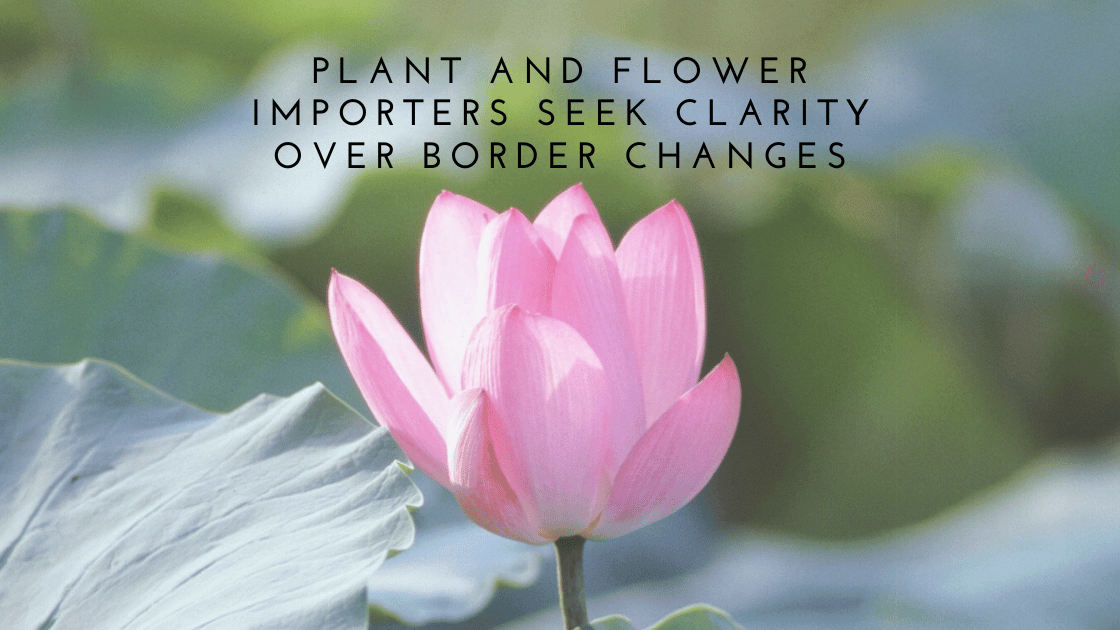Tel: 0161 652 3443 | Email: sales@aeronacca.co.uk
Plant and flower importers in the horticultural industry are facing further uncertainty as the deadline for the Border Operating Model (BTOM) changes arrived on the 30th April.
Trade associations representing these sectors are calling on the government to provide clear and decisive guidance to safeguard the future of horticultural businesses in the UK.
The horticultural, plant and flower trades associations are united in their demands for immediate government action to address the financial risks and logistical issues posed by the border changes.
With the deadline having expired, there is a need for clarity and support to help businesses navigate the complexities of the new border control regulations. Trade associations would have preferred sticking with the previous Place of Destination (POD) scheme and ensuring that the new Border Control Posts (BCPs) were fully operational and accessible to businesses in the horticultural sector.
They are now urging the government to “unlock barriers” to control point access, allowing for thorough testing and functionality of BCPs to enable seamless trade for plant and flower importers.
The call for government intervention comes at a critical point for the horticultural industry, with all stakeholders highlighting the urgent need for proactive measures to mitigate disruptions and protect the viability of plant and flower imports.
By opening Border Control Posts and streamlining access for businesses, the government can provide much-needed clarity and stability to ensure the continued success of the horticultural sector in the face of these evolving border regulations.
The horticultural industry plays a vital role in the UK economy, with plant and flower importers contributing nearly £800 million annually in imports of plants and plant material.
These imports are essential for sustaining all stages of production and the UK supply chain, supporting a diverse and thriving horticultural sector.
The changes are viewed as too sudden and drastic by industry stakeholders, who claim that they pose a significant threat to the viability of the sector.
The shift in border control procedures raises concerns about potential disruptions to the supply chain, leading to reduced choice and the possibility of empty shelves during the summer months ahead.
Industry experts warn that swift government intervention is needed to address the challenges. The horticultural sector could face serious consequences, impacting not only businesses but also consumers who rely on a wide variety of plants and flowers for their landscaping and gardening needs.
With plant and flower importers anxiously waiting for clarity and support from the government to navigate the complexities of the changing border landscape, immediate action is required.
Associations are calling for action to mitigate the risks and ensure the continued success and sustainability of the horticultural industry in the face of unprecedented challenges.
The concerns surrounding the border changes extend beyond plant and flower importers to suppliers on both sides of the channel.
Suppliers from the UK and Europe are expressing worries about the potential increase in expenses and wait times associated with the new regulations, raising fears that smaller nursery businesses may struggle to afford the necessary changes.
The anticipated rise in costs and delays at border crossings, which are already being seen, presents a significant threat to the economic viability of smaller nursery businesses, which rely on efficient trade routes to maintain their operations and meet consumer demand.
With increased expenses and prolonged wait times, these businesses risk being priced out of the market. The tightening of border controls and the accompanying financial burden are adding to existing pressures on the horticultural sector, compounding the challenges faced by businesses on both sides of the supply chain.
The cost is just one issue, and the discussions surrounding the border changes have also raised questions and concerns about the potential risk of cross-contamination within Border Control Posts (BCPs).
Stakeholders are concerned about the possibility of pests and diseases being inadvertently introduced or spread within these post-border checkpoints. This is a critical question in ensuring the biosecurity of imported plants and plant materials.
The industry has already shown a commitment to vigilance and caution against the risks of pests and diseased plants, without the involvement of BCPs.
Horticultural businesses have implemented stringent protocols and measures to prevent the introduction of harmful pathogens and invasive species, recognising the devastating impact such contaminants can have on agriculture, the environment and biodiversity.
Given the measures already in place within the horticultural sector, there is a call for enhanced oversight and monitoring within BCPs to mitigate the potential for cross-contamination.
The growing uncertainty and complexity of the trading landscape are leading to calls for government intervention to protect the diversity and sustainability of the industry.
As the industry braces itself for the full effects of the April changes, stakeholders are urging policymakers to prioritise the needs of horticultural businesses and facilitate a smooth transition to the new border operating model.
By addressing the very real concerns of suppliers and importers, and by providing targeted support to reduce the financial burdens, the government can help safeguard the future of the horticultural sector and ensure that smaller businesses remain a vital part of the industry ecosystem.

